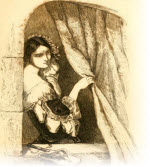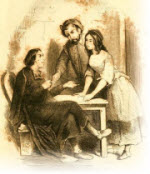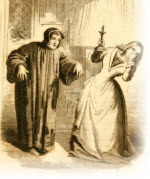
Boccaccio Decameron
The house-flitting is thus told: —
"The dawn had already, under the near approach of the sun, from rosy become golden: when on Sunday, the Queen* arising and arousing all her company, and the chamberlain — having long before sent in advance to the locality where they were to go, enough of the articles required so that he might prepare what was necessary — seeing the Queen on the way, quickly loading all other things as if it were the moving of the camp, went off with the baggage, leaving the servants with the Ladies and the Gentlemen. The Queen, then, with slow steps, accompanied and followed by her Ladies and the three Gentlemen, with the escort of perhaps twenty nightingales and other birds, by a little path not too frequented, but full of green plants and flowers which by the rising sun began to open, took the road towards the west; and gossiping, laughing, and exchanging witticisms with her brigade, arrived before having gone two thousand steps at a most beautiful and rich palace, which, somewhat raised above the plain, was posted on a hill."
As the description of the surroundings of the villa into which the gay assembly now entered is one of the most vivid and one of the gayest pieces of description in the brilliant counterfoil which the author has contrived, to set off the gloom of the city, it is worth giving entire; being as well a noble example of the prose of the "Decameron": —
"Near to which [the balcony on which they had reposed after their walk] having ordered to open a garden which was annexed to the palace, being all inclosed in a wall, they entered in; and as it appeared to them on entering to be of a marvelous beauty altogether, they set themselves to examine it in detail. It had within, and in many directions through it, broad paths, straight as arrows and covered with arbors of vine which gave indications of having that year an excellent vintage, and they all giving out such odors to the garden, that, mingled with those of many other things which perfumed it, they seemed to be in the midst of all the perfumeries that the Orient ever knew; the sides of the paths being closed in by red and white roses and jasmine, so that not only in the morning, but even when the sun was high, they could wander at pleasure under fragrant and odoriferous shade, without entanglement. How many, of what kind, and how planted were the plants in that place, it were long to tell; but there is nothing desirable which suits our climate which was not there in abundance. In the midst of which (which is not less delightful than other things that were there, but even more so) was a meadow of the most minute herbs, and so green that it seemed almost black, colored by a thousand varieties of flowers, and closed around by green and living orange and lemon trees, which, having the ripe and the young fruit and the flowers together, gave not only grateful shade for the eyes, but added the pleasures of their odors. In the midst of that meadow was a fountain of the whitest marble with marvelous sculptures.
From within this, I know not whether by a natural vein or artificial, through a figure which stood on a column in the midst of it, sprang so much water, and so high, falling also into the fountain with delightful sound, that it would at least have driven a mill. This, then (I mean the water which ran over from the fountain), through hidden channels went out of the meadow, and by little canals beautiful and artfully made becoming visible outside of it, ran all around it; and then by similar canals into every part of the garden, gathering together finally in that part of it where from the beautiful garden it escaped, and thence descending limpid to the plain, and before reaching it, with great force and not a little advantage to the master, turned two mills. To see this garden, its beautiful orderliness, the plants and the fountain with the brooks running from it, was so pleasing to the ladies and the three youths that all commenced to declare that if Paradise could be found on earth, they could not conceive what other form than that of this garden could be given to it, nor what beauty could be added to it. Wandering happily about it, twining from the branches of various trees beautiful garlands, hearing everywhere the songs of maybe twenty kinds of birds as it were in contest with each other, they became aware of another charm of which, to the others being added, they had not taken note: they saw the garden full of a hundred varieties of beautiful animals, and pointing them out one to the other, on one side ran out rabbits, on another hares, here lying roe-deer and there feeding stags, and besides these many other kinds of harmless beasts, each one going for his pleasure as if domesticated, wandering at ease; all which, beyond the other pleasures, added a greater pleasure. And when, seeing this or that, they had gone about enough, the tables being set around the beautiful fountain, first singing six songs and dancing six dances, as it pleased the Queen, they went to eat, and being with great and well-ordered service attended, and with delicate and good dishes, becoming gayer they arose and renewed music and song and dance, until the Queen on account of the increasing heat judged that whoever liked should go to sleep. Of whom some went, but others, conquered by the beauty of the place, would not go, but remained, some to read romances, some to play at chess and at tables, while the others slept. But when passed the ninth hour, they arose, and refreshing their faces with the fresh water, they came to the fountain, and in their customary manner taking their seats, waited for the beginning of the story-telling on the subject proposed by the Queen."
Of the character of the Novelle I have need to say little: they were the shaping of the time, and made consonant with its tastes, and nobody was then disturbed by their tone. Some are indelicate to modern taste, and some have passed into the classics of all time. The story of "Griselda"; that of "The Stone of Invisibility," put into shape by Irving; "Frederick of the Alberighi and his Falcon"; "The Pot of Basil"; and "The Jew Abraham, Converted to Christianity by the Immorality of the Clergy," are stories which belong to all subsequent times, as they may have belonged to the ages before. Those who know what Italian society was then, and in some places still is, will be not too censorious, judging lightness of tongue and love of a good story as necessarily involving impurity. And Boccaccio has anticipated his critics in this vein, putting his apology in the mouth of Filomena, who replies to Neifile, when the latter speaks of scandal growing out of their holiday, "This amounts to nothing where I live virtuously and my conscience in no wise reproaches me—let them who will, speak against me: I take God and the truth for my defense."
Advertisements:



Site Updates | Privacy Policy | Site Map | About
This is a website about the Decameron.